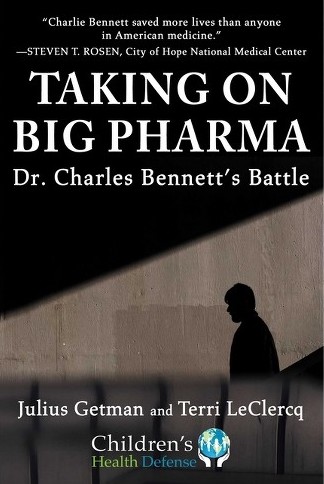
Charles Bennett
Brian Martin
Published in The Whistle (Newsletter of Whistleblowers Australia), No. 114, April 2023, pp. 5-7
Charles Bennett’s research was having an impact, helping to save lives. Bennett, a US medical researcher, was investigating the side effects of best-selling medicines, finding that some were dangerous. His work led several widely used medicines to be withdrawn or have warnings posted about them. Bennett, working with a team at Northwestern University in Chicago, set up a programme to collect information about side effects. Bennett’s research was so successful and well-recognised that he was awarded government research grants totalling millions of dollars per year.

Charles Bennett
But not everyone was happy with Bennett’s findings. Big pharmaceutical companies can make billions of dollars annually from their top-selling drugs, and exposure of side effects can damage sales and lead to massive fines. Bennett was on the radar of one particular company, Amgen.
Pharmaceutical companies do not like anyone who threatens their profits, so scientists, especially those with medical credibility, are prime targets for reprisals. These scientists do not need to make public criticisms of big pharma. It is enough just to do research that gains publicity or leads to regulatory controls.
Bennett was not a whistleblower in the usual sense, but he was treated just like a whistleblower. And there’s a curious twist. The False Claims Act, used by whistleblowers who expose defrauding of the US government, was used against Bennett.
This story is told in a revealing book titled Taking on Big Pharma: Dr. Charles Bennett’s Battle (Skyhorse Publishing, 2023).The authors are Julius Getman, a retired legal academic, and his wife Terri LeClercq, a retired writing professor. They met Bennett on a cruise, became interested in his story of being persecuted and ended up spending years investigating the saga. Getman was especially well placed for this task, having been president of the American Association of University Professors and having much experience dealing with threats to academic freedom, and so is LeClercq, who is an expert on legal writing.

Pharmaceutical companies have often been the target of legal actions under the False Claims Act (FCA). Companies have doctored their in-house research, ghost-written articles touting their own drugs, hidden adverse effects, downplayed contrary research and continued marketing drugs they know are killing people. If the FCA can be used to recoup money from such corrupt companies, it may do something to restrain the worst behaviour.
How then did the FCA end up being used against Bennett, whose research was holding companies to account for promoting dodgy drugs? One of the workers employed under Bennett’s grants, Alice Camancho, initiated the FCA against him, alleging abuse of process and misuse of monies. Much of Getman and LeClercq’s book is devoted to a careful analysis of claims and counterclaims.
The most damning evidence against Bennett was $86,000 paid to a fictitious company. All the payments were approved by Bennett, but evidence was soon available that the scam was run by one of his admin assistants, who used the money to pay for her wedding and honeymoon. Bennett, who was focused on scientific matters, not administration, was unaware of the fraud. No evidence was ever provided that Bennett obtained any money illicitly. All that could be proved was that some of the usual accounting rules were not followed. As Getman and LeClercq note, this is not something covered by the FCA, which is about defrauding the government.
Despite the lack of damning evidence, the government persisted with the FCA against Bennett. The story includes many sordid features, including sustained hostility, conflicts of interest and double standards. The pharmaceutical company Amgen, which didn’t like Bennett’s research, was itself subject to an FCA suit, which it settled for $760 million. Meanwhile, the government persisted for years with the FCA case against Bennett, although the amounts were piddling by comparison.
Administrators at Northwestern University, Bennett’s employer, seemed uninterested in defending him. Instead, Bennett was locked out of his office and forbidden to accept new research grants. After years of harassment, he took a job elsewhere. Northwestern eventually settled the FCA but did not include Bennett in the settlement, leaving him legally vulnerable, and he ended up paying dearly even though he was never proven to have done anything wrong. The government’s threat to take him to court was enough to make him settle the case.
Getman and LeClercq: “At every stage of the proceeding, Northwestern’s administrators treated Charlie with suspicion and accusation. It started with the department chief’s supporting Camacho’s claim that Charlie’s use of his grant money violated the False Claims Act; was followed by Charlie’s office being locked with no warning and for no significant reason; continued with the limits placed on his legal support and gulag-like conditions attached to his leave. It culminated in an official university statement that continues to besmirch his reputation.”

Julius Getman
At one point, an Amgen executive threatened to destroy Bennett’s career, and there were other hints of the company playing a role in the prolonged campaign against him but, as Getman and LeClercq say, there is no “smoking gun,” no definitive proof than Amgen or another company was behind the campaign.

Terri LeClercq
Perhaps, though, overt company interventions were not needed. In 1971, Matthew Crenson’s book The Un-politics of Air Pollution was published. Crenson analysed decision-making by government officials in Gary, Indiana and East Chicago, finding that they served the interests of US Steel, the dominant company in the area. Officials didn’t need to be coerced or even prompted, because their mindset was conditioned by the company’s power. Even in the absence of outside pressure, they unthinkingly made decisions serving the company’s interests.
Similarly, university officials can serve the interests of big pharma without any external prodding. The imperative to serve industry is a sort of background assumption, a way of thinking that guides policy and practice, and which can lead some university figures to instigate reprisals against dissidents, like Bennett, who threaten the university’s cosy relationship with industry. Indeed, it might be said that attacking Bennett proved to industry sponsors that the university was loyal to them.
Getman and LeClercq, when they first began investigating Bennett’s case, approached a range of individuals. They were surprised that no one at Northwestern was willing to talk about the case. It is also significant that no one at Northwestern spoke out about the Bennett saga: there were no insiders who blew the whistle. It rested with outsiders — Getman and LeClercq — to expose the sordid story.
For anyone whose work or public commentary threatens a powerful group, there is an important lesson. Laws may be passed to aid whistleblowers, but sometimes these same laws can be turned around and used against those who most need protection. As Getman and LeClercq note, readers of their book may learn that “the highly revered Whistleblower Act of 1989 can be used to destroy individuals who stand in the way of big money and big profits.” Publicity remains the most powerful tool against attacks on dissent, but few will have the good fortune of finding persistent investigators like Getman and LeClercq to document and publicise their cases.
Brian Martin is editor of The Whistle.
Brian Martin's publications on suppression of dissent